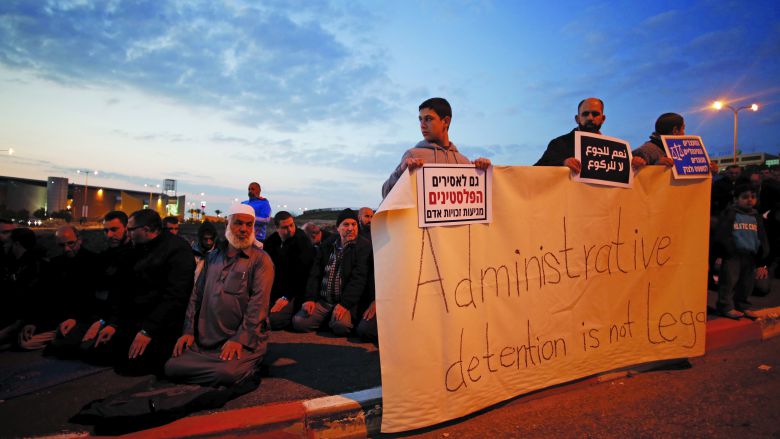
Demonstrators call for the release of Palestinian journalist Mohammed Al Qeq, outside Haemek hospital, February 9. Qeq, 33, is reported to have been on the world’s longest hunger strike to protest at his administrative detention in an Israeli jail. REUTERS/Baz Ratner
Israel’s administrative detention is inhumane
BY Ben White
On February 26, Palestinian journalist Mohammad Al Qeeq ended what has widely been reported as one of the longest hunger strikes on record. Al Qeeq was detained at his home in Ramallah by Israeli forces last November and subsequently placed under administrative detention without any charges, and no trial. After 94-days of abstention, a deal was struck with the Israeli authorities. He is now set to be released in two months, on May 21.
But the journalist’s hunger-strike was notable for another reason; the case threw into sharp relief aspects of Israel’s military regime in the West Bank that it prefers to keep out of the spotlight.
First, Al Qeeq’s detention is symptomatic of a wider undermining of press freedom by the Israeli authorities. Although the recent brief detention of two journalists working for The Washington Post by Israeli border police officers made headlines, Palestinian media workers are routinely harassed, detained, or subjected to violence, at the hands of Israeli forces.
On February 29, in a much less publicized case, Ahmad Hamed Al Betawi, a Palestinian journalist from Nablus, was sentenced by an Israeli military court to 11 months jail time for “incitement against Israel’s military occupation through his work as an editor with Quds Net News Agency.” But Al Qeeq’s case also highlights a practice that violates international humanitarian law in the way that it is applied by Israel: The policy of administrative detention.
A typical example goes like this. A Palestinian is arrested —at home, at a checkpoint— and taken into the custody of Israeli occupation forces. They are then interrogated and often abused or tortured, in the hope of soliciting a confession that can be used for a slam-dunk verdict in a military court. If, however, no confession is forthcoming, and in the absence of evidence deemed sufficient even for a military court system that has a 99.74 percent conviction rate, another option is available to the Israeli authorities.
A military commander will sign an administrative detention order, of anything up to six months in duration, based on secret evidence that the prisoner and their lawyer will not see. A military judge approves the order, and the Palestinian is condemned to a period of detention of unknown duration. The order can be renewed indefinitely, once every six months.
The Israeli army issues administrative detention orders against Palestinians based on Military Order 1651, which empowers commanders to detain an individual if they have “reasonable grounds to presume that the security of the area or public security require the detention.”
But who, according to the Israeli authorities, threaten ‘public security’? People like Mohammed Abu Sakha, a circus performer and clown, who was detained at an Israeli checkpoint on December 14, 2015, and issued with an administrative detention order. He was on his way from his parents’ home in Jenin to his work at the Palestinian Circus School near Ramallah. In his absence, the program for special needs children he was running has closed. Israel says Abu Sakha is detained based on “confidential military intelligence” as a “severe security threat.”
Then there is Asma Qadah, a 21-year-old fourth-year student in the Faculty of Arts at Birzeit University. She was arrested at a checkpoint on December 19, 2015, and three days later, was issued a three-month administrative detention order by the Israeli military commander. At the hearing confirming the order, the judge refused to reveal any of the information within the secret file.
International law does in fact permit the use of administrative detention; Article 78 of the Fourth Geneva Convention allows for the Occupying Power to subject protected persons – that is to say, civilians in the occupied territory – to “assigned residence” or “internment,” but only if necessary “for imperative reasons of security.”
The Fourth Geneva Convention, however, assumes that occupation is a temporary state of affairs, and grants the occupying power certain leeway–and responsibilities–in order to restore order post-conflict. Israel’s military occupation of the West Bank (including East Jerusalem) and Gaza Strip, on the other hand, has lasted 49 years, a situation not envisaged by the Conventions’ authors.
According to prisoners’ rights group Addameer, although administrative detention is only to be used in exceptional circumstances and on a case by case basis, Israel’s use of the practice is “systematic and widespread.” Pointing to a significant increase in administrative detainees since October, the group told me that the statistics and case studies make it clear Israel is violating international law.
This uptick—over a ten-day period in February, 84 administrative detention orders were issued—was criticized by senior U.N. official Robert Piper, who in a statement last month said he was “deeply concerned about the continued practice of administrative detention in Israeli jails and detention centers,” adding that all such detainees “should be charged or released without delay.”
In 2009, the U.N.’s Committee against Torture similarly challenged the Israeli government’s claim that administrative detention is only used in exceptional circumstances. The Committee described its application in the West Bank and Gaza Strip as not conforming to the prohibition of cruel, inhuman or degrading treatment or punishment, as it is uses for “inordinately lengthy periods.”
Furthermore, as is the case for thousands of other Palestinian prisoners tried in military courts, administrative detainees are often held in prisons outside of the Occupied Palestinian Territory (OPT), inside Israel’s pre-1967 territory. This is a violation of the Geneva Conventions, and makes it difficult or impossible for prisoners to receive family visits, as relatives are denied entry permits by Israel.
Even children are not immune. According to Defense for Children International-Palestine (DCI-P), eight Palestinian minors have been issued administrative detention orders since October 1, 2015, up to the end of February. The most recent order was against 15-year-old Abdul-Rahman Kmail, from Jenin, whose four-month detention without trial or charges was confirmed on February 16.
These recent cases are the first time Israel has used the measure against Palestinian children in the West Bank since 2011–but the first time on record that minors with East Jerusalem residency have been so detained. Mohammad Hashlamoun, for example, is serving a six-month administrative order that expires on June 20. The 17-year-old was “held in solitary confinement for 22 days, denied access to an attorney, and subjected to repeated prolonged interrogation sessions.”
Such actions by the Israeli authorities violate a number of provisions within the U.N. Convention on the Rights of the Child–to which Israel is a signatory–including Article 37, which states that “no child shall be deprived of his or her liberty unlawfully or arbitrarily,” and that “the arrest, detention or imprisonment of a child shall be in conformity with the law and shall be used only as a measure of last resort and for the shortest appropriate period of time.”
Administrative detainees comprise around one in 10 of all Palestinian prisoners, with approximately 7,000 Palestinians currently in Israeli jails. They include some 450 child prisoners, as well as seven parliamentarians. Administrative detention is thus one tool in a wider apparatus of routine arrest raids, military trials, and detention.
The evidence, and analysis by human rights workers, makes it clear that Israel is using administrative detention, illegally, as a substitute for prosecution where there is insufficient evidence to charge and convict. Moreover, as with Israel’s wider and ongoing arrests campaign, it is being used in a systematic fashion to target Palestinian political activists and community organizers.
As a U.N. source told me, many of the administrative detainees are the “people that the Israelis find are influencing things in the “wrong way” for Israel, helping to maybe build political activities geographically, or with political parties that the Israelis want to keep down.” But the official added that political activity is not grounds for arrests under human rights conventions or in occupied territories.
Israel, however, continues to dismiss criticism, and even refuses to engage with its allies. Just recently, Israeli authorities cancelled a scheduled visit to Israel and the OPT by a follow-up delegation of senior British lawyers, who published a report in 2012 on ‘Children in Military Custody’. The most the UK government could muster was an expression of “strong disappointment.”
Without stronger measures by the international community, and in particular Israel’s friends in Europe and North America, Palestinian students, circus performers, and journalists will continue to languish in Israeli prisons thanks to a system that is not just Kafkaesque, but an inherent part of a military occupation that only strengthens with each passing year.




